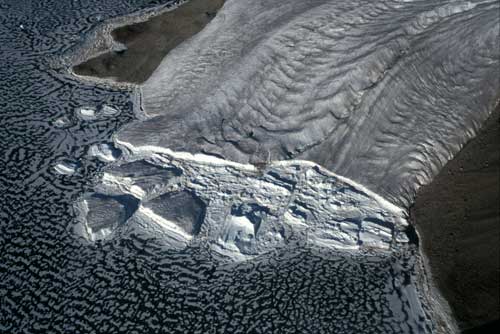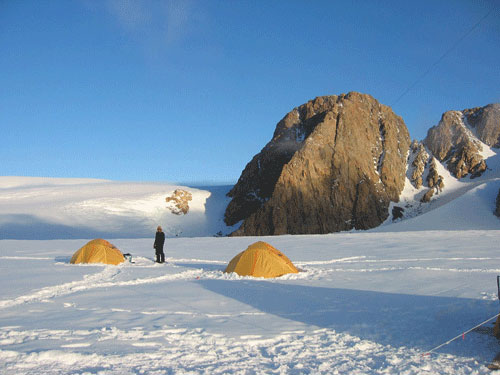
Northern Canada glaciers melting fast
May 02, 2011
“It was a massive increase between these two periods (2004 – 2006 and the record warmth of 2007 – 2009),” said glaciologist Gabriel Wolken, coauthor of a new paper in which scientists claim that glacial ice of the Canadian Arctic Archipelago contributes more to sea-level rise than any regional group of ice outside Greenland or Antarctica. The Canadian Arctic Archipelago is a group of 94 islands east of Greenland with a land area the size of Alaska. The glaciers and ice fields of the islands cover an area about the size of New York.
A tidewater glacier calving into Hayes Fiord, on Ellesmere Island in Canada’s Arctic.
During their fieldwork in the northern melt season — which can be as short as just a few days in July or as long as the months of May through mid-August, depending on elevation and which way the glaciers face — the researchers experienced one of the warmest summers on record in 2008. “It got to 58 degrees Fahrenheit one day on Devon Island,” Wolken said. “That really made for some hazardous conditions in the field, with big slush flows. On days like that, you sort of get the direct picture of what’s happening there in terms of sea-level rise.” During the period of the study, from 2004 until 2009, the melting ice of the archipelago added about 1 millimeter to world sea level. The water lost equaled 75 percent of the volume of water in Lake Erie, Gardner said. Unlike Alaska glaciers, which are more tied to precipitation and temperature as they grow and shrink, the far-north Canada glaciers are slaved to air temperatures. “It’s a polar desert up there — there’s not much snowfall in winter,” Wolken said. “It’s really changes in air temperature that dictate what’s going on.” Record warmth in the latter period of the study led to the drastic increase in melting.
The University of Alberta’s Angus Duncan at a fieldwork camp on upper Belcher Glacier, Devon Ice Cap, Devon Island, Arctic Canada.
University of Alaska Fairbanks Geophysical Institute glaciologist Regine Hock said the results published in the Nature paper agree with a study she had published earlier this year. “It is great work,” she wrote in an e-mail. “The paper seems sound and the message clear. I do agree with the conclusions, which nicely complement our January paper where we find that the Canadian Arctic (will be) a major contributor (to sea-level rise) over the next 100 years.” Anthony Arendt is also a G.I. glaciologist who said that Canada’s far north, a somewhat overlooked area, will not be that way anymore. “Mass losses in the Canadian Arctic appear to have increased significantly, and this region is now an important contributor to the global sea-level budget.”
This column is provided as a public service by the Geophysical Institute, University of Alaska Fairbanks, in cooperation with the UAF research community.
E-mail your news &
photos to editor@sitnews.us
|

